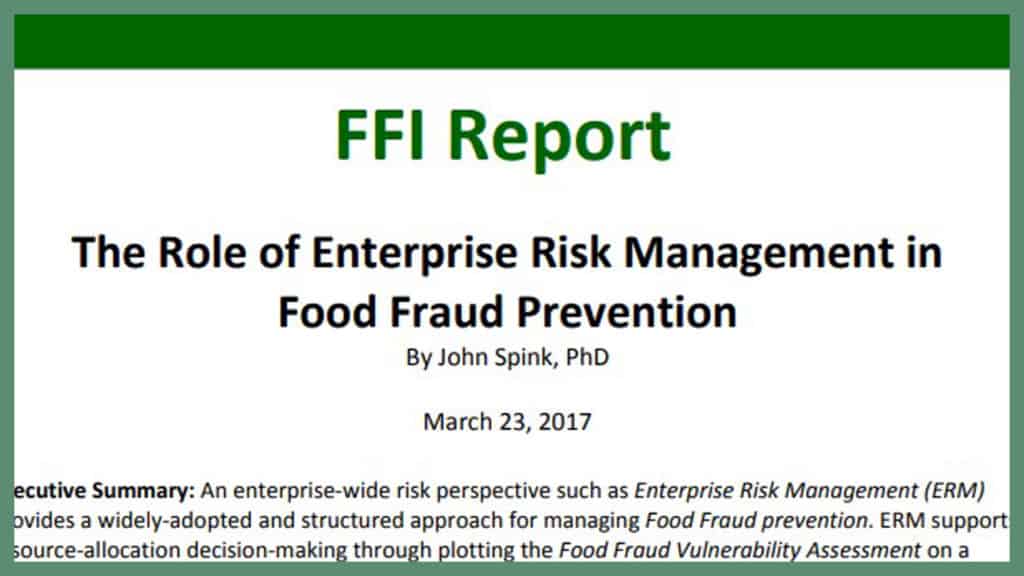Your CEO – and possibly you – are legally liable for managing the financial impact of Food Fraud, whether you know it or not. This is an ‘inherent’ risk and addressing Food Fraud does NOT create a NEW risk. Attached you will find our new ERM report, a link to a YouTube video lecture, and a registration link for our webinar on May 17, 2017.
- Report: https://blog.foodfraudpreventionthinktank.com/wp-content/uploads/2021/02/FFI-Backgrounder-the-role-of-ERM-v50-formatted-FFPTT-v1.pdf
- Video: https://youtu.be/Cg8T9C8nURs
From our report:
“Before starting, it is critical to clarify that addressing Food Fraud does NOT create NEW risks. Addressing Food Fraud proactively identifies a COSO-defined ‘inherent risk’ that is already present – which, regardless of knowledge, the Board and C-Suite are accountable for – so they can be prevented or mitigated. The options are to (1) ignore the risk and hope for the best or to (2) implement Food Fraud Prevention Strategy. Not being proactive can destroy a company and be a felony crime.”
……………………………..
FOR IMMEDIATE RELEASE — Contact: Dr. John Spink, Director & Assistant Professor, Food Fraud Initiative
Our team received a generous gift from an anonymous donor to support a Food Fraud Insight Report (FFI Report) on The Role of Enterprise Risk Management in Food Fraud Prevention. This report was published on March 28, 2017 and will be presented by Dr. Spink at the Food Safety Summit May 13, 2017, Chicago).
Dr. Spink stated, “Gifts like this enable us to pursue the most important Food Fraud prevention research questions regardless of the current public government funding or the opportunity to publish in the academic journals.” As for public funding, most countries haven’t even formally defined Food Fraud yet, let alone defined the research needs in strategy and policy. Food Fraud is becoming a more common academic journal publication topic and we are just now starting to see increased awareness of the needs in more applied and interdisciplinary research.
The definition in the 2011 Journal of Food Science article Defining the Public Health Threat of Food Fraud has been widely quoted including by the Elliott Review (United Kingdom), the European Commission resolution addressing Food Fraud, early Global Food Safety Initiative (GFSI) Food Fraud Think Tank presentations, and the Congressional Research Service report on Food Fraud (USA).
This report focused on the application of Enterprise Risk Management (ERM) – a function of the Council of the Sponsoring Organization of the Treadway Commission (COSO, itself a group of the five leading financial or managerial accounting associations) – to Food Fraud prevention. ERM, or ERM-like processes, are “THE” way that Chief Financial Officers and Chief Executive Officers review, manage, and present their risks to their Board of Directors and Shareholders.
Enterprise Risk Management (ERM) – or ERM-like systems – is a regulatory compliance requirement for public companies under the Sarbanes-Oxley Act. Privately held companies usually have a similar “Internal Controls – Integrated Framework” requirement. ERM is a way to assess, manage, and calibrate all risks across an organization.
Dr. Spink added that “Working with organizations such as our donor helps us not only to fund our work but to leverage their deep insight on other emerging areas such as enterprise-wide, resource-allocation decision-making, ERM and COSO.”
Dr, Spink stated, “We are pleased to have these great opportunities to work with practitioners such as the donor. Together we are directly addressing what may be the most urgent and important Food Fraud prevention challenge, which is how decisions are actually made. This new report specifically supports ‘resource allocation decision -making.’
……………………………..
From the FFI Report
The Role of Enterprise Risk Management in
Food Fraud Prevention
December 1, 2017
From the final report:
“Executive Summary: An enterprise-wide risk perspective such as Enterprise Risk Management (ERM) provides a widely-adopted and structured approach for managing Food Fraud prevention. ERM supports resource-allocation decision-making through plotting the Food Fraud Vulnerability Assessment on a Corporate Risk Map.
Food Fraud – deception for economic gain using food – is a unique risk to brand equity, sales, incident cost, consumer satisfaction, and social harmony. Board of Directors and C-Suite leaders know they are criminally liable under the Park Doctrine and Sarbanes-Oxley. Recently, the US DOJ emphasized that individual employees are liable for a wide-range of criminal felony charges for even knowledge – “willful blindness” – of ongoing Food Fraud regardless of whether there was a hazard or death.
Addressing Food Fraud is a requirement for the Food Safety Modernization Act, the Chinese Food Safety Laws, and the industry-led Global Food Safety Initiative (GFSI). GFSI has been leading this through specifying a (1) Food Fraud Vulnerability Assessment (FFVA) that covers all products and an (2) enterprise-wide Food Fraud Prevention Plan (FFPP). GFSI stated their support for the SSAFE guidance on Food Fraud Vulnerably Assessment (FFVA). The SSAFE FFVA is automated and made public by PwC.
While there are immense and intense penalties, there are some very basic and fairly simple steps to address Food Fraud. A missing link in Food Fraud prevention was an enterprise-wide correlation of the risk to all other portfolio risks. An enterprise could be a private company, a government owned company, or a government. Fortunately most companies have already implemented COSO based Enterprise Risk Management (ERM) type systems for securities or financial audit compliance.”
Video Presentation of this Report at: YouTube: https://youtu.be/Cg8T9C8nURs
This project funded through a generous gift from an anonymous corporation
END

